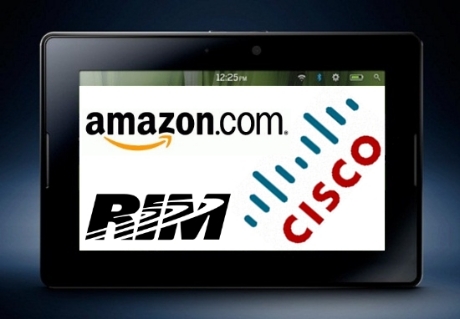PlayBook needs Cisco, Amazon to stand a chance vs. Apple, Android


In order to present a compelling tablet OS platform to enterprises and consumers alike, RIM needs to ally itself with two of the strongest players in their respective spaces: Cisco and Amazon.
Yesterday, I spoke of the current shortcomings in Research in Motion's recently released BlackBerry PlayBook and the company's strategy to enlarge the new tablet's application ecosystem by making it compatible with Google's Android device OS's Dalvik VMas well as provide for portability of existing BlackBerry OS 6 Java apps and new native C++ QNX applications in addition to the existing Adobe AIR/Flash and WebWorks APIs currently available on the device.
While all of this forthcoming application and developer ecosystem activity is all good news and is important to bringing value to the BlackBerry PlayBook brand, RIM needs to do more than just get good apps. It needs good partnerships and alliances as well.
At the moment, RIM is facing down the barrel of two very powerful competitors -- Apple, with its iOS-based iPad, and Google with multiple OEM partners including Samsung, Motorola, HTC, Asus and Acer producing a plethora of Android 2.x "Gingerbread" and 3.x "Honeycomb" based tablets.
And if that wasn't bad enough, the PlayBook is also going to face competition from Hewlett Packard and its formidable retail distribution channel with their Palm WebOS 3-based TouchPad sometime this summer.
As tablet player #3, and trailing considerably by a huge margin, RIM needs to gain some powerful allies which can help it make some strong inroads in both the enterprise space (for which the device is targeted for) as well as with consumers that otherwise would not think even twice about looking at the device given competing products like the iPad or Motorola's XOOM.
It occurred to me that there are two natural alliances which could be made for the mutual benefit of all three companies -- Cisco, the enterprise networking, Voice and Video/Telepresence over IP giant, and Amazon, the current leader in e-Books with its Kindle service and also the second largest provider of online music and video content through its Amazon MP3, Amazon Cloud Player and Amazon Instant Video services.
Why Cisco? Well, it's no secret that the company is developing of suite of applications to tie in the company's various video conferencing products with mobile operating systems such as Android and iOS. It's also developing its very own 7" teleconferencing tablet device based on Android, the Cius, which was announced last summer.
Cisco's tablet is yet to be released, but there are a number of Android applications that are supposed to appear on the device which seem like they would be excellent value-adds to the BlackBerry Playbook.
Namely, this includes HD video conferencing using Cisco TelePresence standards, collaboration with WebEx and Virtual Desktop integration.
With the Cius seemingly lost in development limbo and not due for release to selected customers until at least the end of May, it occurs to be that Cisco would be best served by taking these Android apps that exist in their stable and porting them over to RIM's PlayBook, which will have Android 2.3.3 compatibility with their Dalvik-compatible JVM "Player" by this summer.
The 7" PlayBook seems almost a natural stand-in for the Cius's video-over-IP duties, considering that it is armed with forward-facing 3MP and rear-facing 5MP high-definition cameras. This makes it much more suited to video teleconferencing than the iPad, which only has a VGA resolution front-facing camera and 1MP rear camera.
Cisco should become a premier Value Added Reseller and partner for Research in Motion, and RIM should be working closely with Cisco to help integrate their video conferencing products at their shared enterprise customers.
Frankly, if I was Cisco, I would be inclined to kill off the Cius as a hardware product and simply develop a Cius-branded and cross-platform Android, iOS and QNX-based software suite. This way enterprises can use any tablet and smartphones they want to interoperate with Cisco's telepresence protocols and devices. This is especially important as companies are increasingly moving to "Bring Your Own" device models.
And what of Amazon?
Well, they've got Amazon Kindle for Android, which according to RIM should be a simple port to the BlackBerry App World using their re-packaging tools. And of course they have Amazon MP3/Cloud Player as well. Amazon's Instant Video is already built on Flash, so there's no reason why they couldn't quickly turn around a portable version in Adobe AIR.
However, I think there's another important role that Amazon could play, and that is to act as the "Curator" for Android applications on the PlayBook. Essentially, what I'm suggesting is that RIM should outsource its Android apps using Amazon Appstore for Android.
Currently, RIM is planning to make developers to repackage and re-qualify Android applications before they can be submitted to BlackBerry App World. From what I've seen of the PlayBook's implementation of BlackBerry App World, it's not a very well-designed application and is organized awfully.
Amazon's Appstore for Android, however, is of an even better design and user experience than what exists on Google's own Android Market.
What I propose is simple. RIM contracts Amazon to build a PlayBook JVM-compatible version of Appstore for Android, with a dedicated team of software engineering folks lent by RIM that will curate PlayBook-certified Android apps submitted to the store. The two companies then work out a revenue-sharing agreement for apps sold on this special PlayBook version of the Appstore.
The result? Balsillie and Lazardis's fledgeling QNX tablet OS gets all the current and future value-added content services goodness from Amazon, Bezos and company curates Android apps for the PlayBook with RIM's software engineering assistance, and both companies profit.
Should RIM, Cisco and Amazon form a powerful triad in an attempt to push back the Apple and Google tablet menace? Talk Back and Let Me Know.